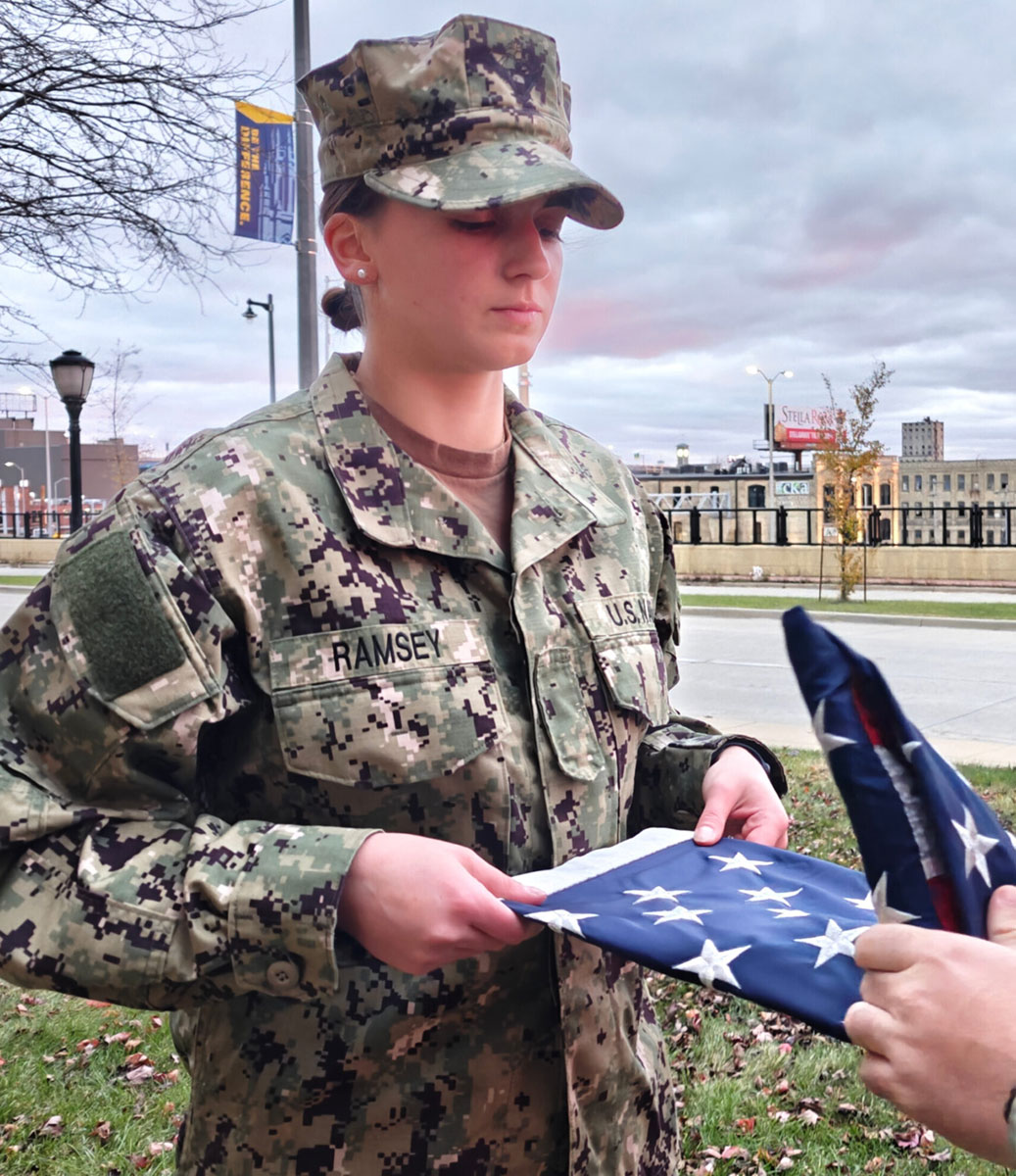
Freshman nursing student Jacquelyn Ramsey folds an American flag. Ramsey is in the navy nursing ROTC program.
‘It gets you used to doing hard things:’ Inside the life of a Naval Nursing ROTC student
Early wakeup calls, eight-mile runs build character for future military nurses
By Andrew Goldstein | Marketing Communications Associate
By the time most of freshman Greg Dineen’s classmates show up for 9 a.m. class in David A. Straz, Jr. Hall on Mondays, he’s been up for hours. Dineen has already done his pushups, run five miles and carried members of his platoon over his shoulder.
“I had the absolute worst time management ever in high school; now I’m on a schedule and I really have to plan ahead,” Dineen says.
It’s one of many life changes that happen when a student signs up for Reserve Officer Training Corps, a training program that prepares full-time college students for service in the armed forces. The Marquette branch of the ROTC, established in 1918, has trained thousands of students who have served in the Army, Navy, Air Force, Marine Corps, and Space Force.
Marquette offers a special program to students interested in becoming naval nurses. Midshipmen in nursing ROTC take nursing and naval classes simultaneously, then apply their learnings through real-world experience working at a Navy hospital and on ships during two of their collegiate summers. When midshipmen graduate, they do so prepared for a career in the armed forces.
While Dineen has always wanted to be in the military, the Navy seems at first like an odd choice given his background; Dineen’s father was in the Army and his hometown of Colorado Springs is also home to the Air Force Academy. However, Marquette’s NROTC nursing scholarship and the plentiful opportunities available for naval nurses persuaded him to go a different direction.
“There are a lot of opportunities for midshipmen to become nurses right now and I think if anyone is thinking about doing it, they definitely should,” Dineen says, while adding that he enjoys playing soccer with his squadmates during physical training and competing in drill competitions in Madison.
The path is not for the faint of heart, however. Incoming midshipmen undergo a two-and-a-half-week New Student Induction over the summer at Great Lakes Naval Station near Chicago. Sequestered from their phones, prospective midshipmen go through an abbreviated boot camp, complete with intense exercise, weapons training, firefighting basics and a crash course in military etiquette. There’s no rest once the year starts, either: midshipmen undergo physical training on Mondays and Thursdays early in the morning before class.
For Jacquelyn Ramsey, a freshman NROTC nursing student, her time in the unit has already come with many life lessons.
“Building relationships is important because you work as a team so often, particularly in that training over the summer, and those are skills you take with you when you get your commission,” Ramsey says. “Getting used to balancing life in NROTC is an adjustment too. I always have planners and things to help me get my work done on time.”
When Ramsey and Dineen graduate, they may have a life that looks something like the one Ensign Veronica Edwards lives. A 2023 graduate of the College of Nursing and NROTC, Edwards is stationed at Marine Corps Base Camp Pendleton in her hometown of San Diego. Prior to that, she worked in the multi-service ward of Naval Medical Center Portsmouth in Portsmouth, Virginia, treating service members and their families.
Edwards held many titles as an NROTC midshipman. She was a public affairs officer, squad leader, platoon commander and, as a senior, commander of the entire NROTC company. Those experiences forged her into the caring, committed nurse she is today.
“ROTC was really good for getting used to doing hard things,” Edwards said with a laugh. “Getting up early in the morning for that physical training, then having a full eight-hour day of classes afterward is not the easiest thing, but that gave me a good foundation for life. It made me say, ‘I know I can overcome difficulties.’”
Ultimately, NROTC nurses are training to be health care workers in times of war. The midshipmen who work in military hospitals could deploy to combat zones overnight, applying principles of emergency room and intensive care unit practices in the heat of battle. Going through Nursing NROTC means accepting this responsibility should it ever arise.
Marquette Nursing builds people who can shoulder such a task. Through education in the fundamentals of nursing, emphasis on social determinants of health and guaranteed clinical placement, Marquette ensures that midshipmen have the medical education to go along with their military training. Balancing the two is far from easy, but those who do it find the path rewarding.
“Some people are scared of the training and the requirements for being in ROTC but when you look back, you really only think about the good memories you have, and there are a lot of them,” Dineen says.
Naval ROTC has full scholarships available for sophomore nursing students who participate in the program. Anyone interested should contact Capt. Jim Pokorsky (jim.pokorsky@marquette.edu) or Zachary Henry (zachary.henry@marquette.edu)
